NC Duck Guides provide expert knowledge and resources for waterfowl enthusiasts, offering insights into hunting strategies, conservation efforts, and the rich duck culture in North Carolina.
1.1 What Are NC Duck Guides?
NC Duck Guides are experts and resources dedicated to providing comprehensive information on duck hunting, conservation, and management in North Carolina. They offer insights into waterfowl behavior, hunting strategies, and legal guidelines, serving both experienced hunters and newcomers. These guides play a crucial role in promoting sustainable practices and fostering a deeper understanding of North Carolina’s rich duck hunting traditions and wildlife conservation efforts.
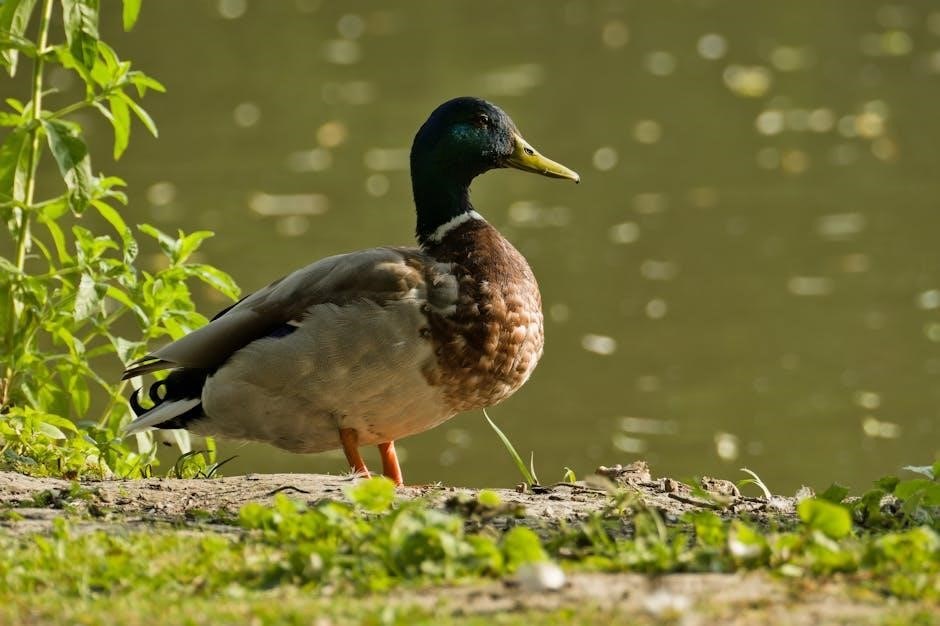
1.2 Importance of Duck Guides in North Carolina
NC Duck Guides are vital for educating hunters and outdoor enthusiasts about waterfowl management, conservation, and sustainable hunting practices. They provide essential knowledge on local species, habitats, and regulations, ensuring responsible hunting and environmental stewardship. By fostering awareness and community engagement, these guides help balance hunting traditions with wildlife conservation, preserving North Carolina’s ecosystems for future generations while promoting a deeper appreciation for its natural resources.
Types of Ducks in North Carolina
North Carolina is home to a variety of duck species, including migratory waterfowl and resident ducks, offering diverse opportunities for birdwatchers and hunters alike.
2.1 Migratory Waterfowl Species
North Carolina serves as a critical stopover for migratory waterfowl, attracting species like mallards, teal, and gadwalls. These birds travel along the Atlantic Flyway, drawn to the state’s coastal wetlands and abundant food sources. Migratory species often overlap with resident ducks, creating diverse hunting opportunities. The state’s wetland habitats and seasonal changes make it a key location for waterfowl migration patterns.
2.2 Resident Duck Species
North Carolina is home to various resident duck species, including wood ducks, black ducks, and mergansers. These birds thrive in the state’s freshwater habitats, such as ponds and rivers, and are valued for their unique characteristics and ecological roles. Resident species contribute to the state’s rich biodiversity and provide consistent opportunities for birdwatchers and hunters alike throughout the year.
Duck Hunting Regulations in NC
NC duck hunting regulations ensure sustainable waterfowl populations by setting bag limits, permit requirements, and hunting seasons. These rules balance recreation with conservation, protecting wildlife and habitats for future generations.
3.1 Hunting Seasons and Bag Limits
Duck hunting in North Carolina operates under strictly regulated seasons to ensure sustainable populations. The season typically runs from late fall to early winter, with specific dates varying annually. Bag limits are set to balance recreational hunting with conservation, allowing a maximum number of ducks per hunter daily. These regulations are enforced by the NC Wildlife Resources Commission to protect both migratory and resident waterfowl species, ensuring healthy ecosystems for future generations.
3.2 Licensing Requirements
Duck hunting in North Carolina requires specific licenses, including a state-issued hunting permit and a federal duck stamp. Hunters must obtain these licenses annually to legally hunt waterfowl. Additional permits may be needed for hunting on private lands or designated wildlife refuges. Licensing ensures compliance with conservation efforts and supports habitat preservation initiatives. Licenses can be purchased through the NC Wildlife Resources Commission or authorized vendors.
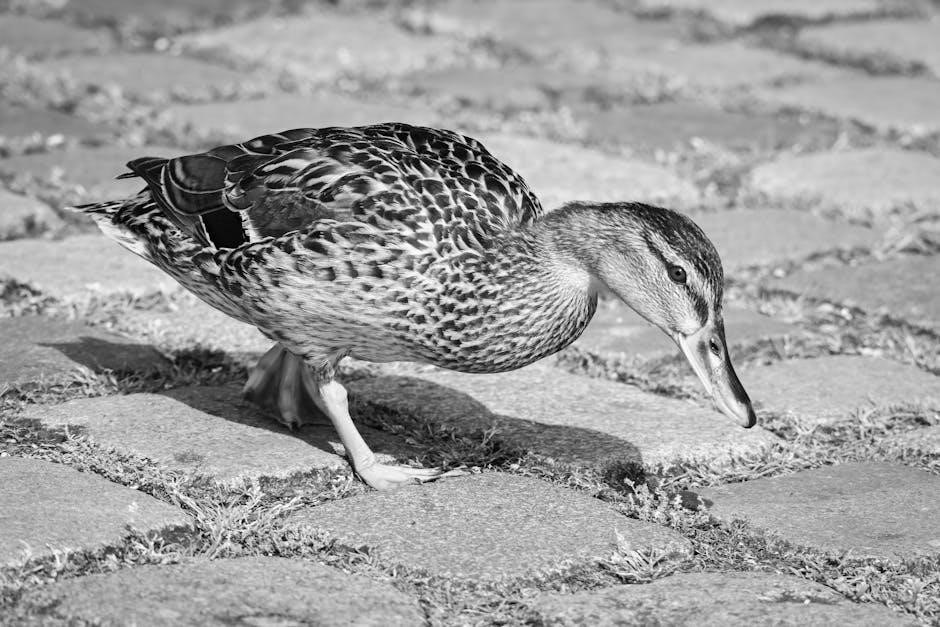
Best Locations for Duck Hunting in NC
Coastal wetlands, marshes, and freshwater lakes offer prime duck hunting spots in North Carolina, attracting waterfowl and hunters alike with abundant wildlife and ideal habitats.
4.1 Coastal Wetlands and Marshes
North Carolina’s coastal wetlands and marshes are renowned for their rich biodiversity, offering ideal habitats for waterfowl. The Outer Banks and Cape Hatteras are prime locations, with their mangroves, mudflats, and salt marshes providing shelter and food for ducks. These areas are crucial during migration seasons, attracting thousands of birds. Hunters often use decoys and calling techniques here, making these regions a hotspot for duck hunting enthusiasts while adhering to local regulations to ensure sustainability.
4.2 Freshwater Lakes and Rivers
Freshwater lakes and rivers in North Carolina, such as Lake Mattamuskeet and the Neuse River, are vital habitats for ducks. These areas support species like wood ducks and mergansers. Hunters often use kayaks or small boats to navigate these waters, employing decoys and calls to attract birds. The calm, vegetated environments make them ideal for both migratory and resident duck populations, offering unique hunting opportunities throughout the season.
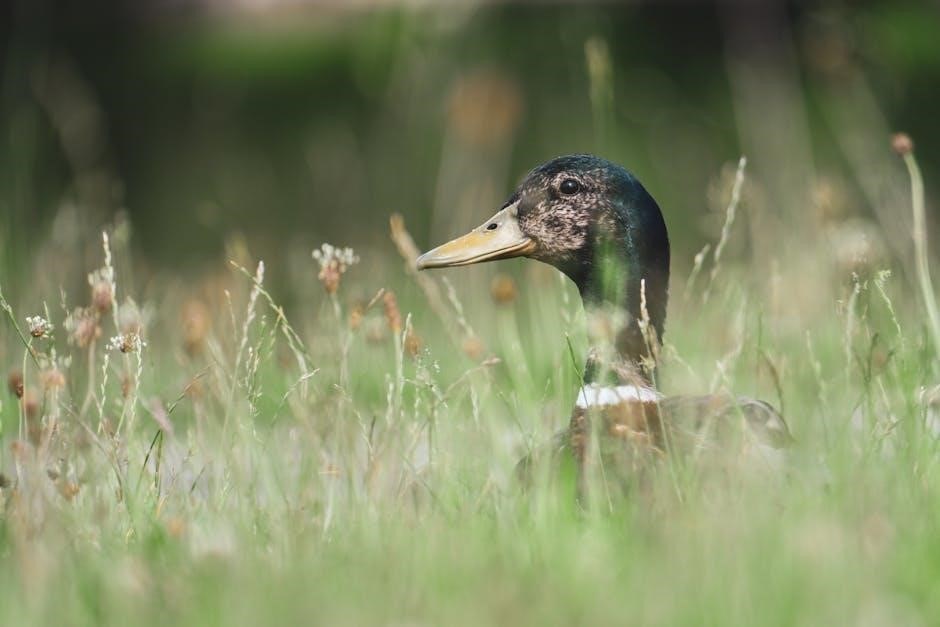
Conservation Efforts for Ducks in NC
North Carolina’s conservation efforts focus on preserving wetland habitats and promoting sustainable hunting practices to protect duck populations and maintain ecological balance for future generations.
5.1 Habitat Preservation Initiatives
North Carolina’s habitat preservation initiatives focus on protecting and restoring wetlands, marshes, and coastal ecosystems. These efforts ensure ducks have safe nesting areas, abundant food sources, and migration corridors. Partnerships with conservation organizations and local communities play a vital role in maintaining these habitats, ensuring biodiversity and ecological balance for both migratory and resident duck species.
5.2 Role of Duck Hunting in Conservation
Duck hunting plays a crucial role in conservation by supporting habitat management and funding for wildlife programs. Hunters contribute through licenses and fees, which are used to restore wetlands and protect migratory routes. Regulated hunting ensures sustainable duck populations, balancing recreational and ecological needs while promoting biodiversity and environmental health in North Carolina’s ecosystems.
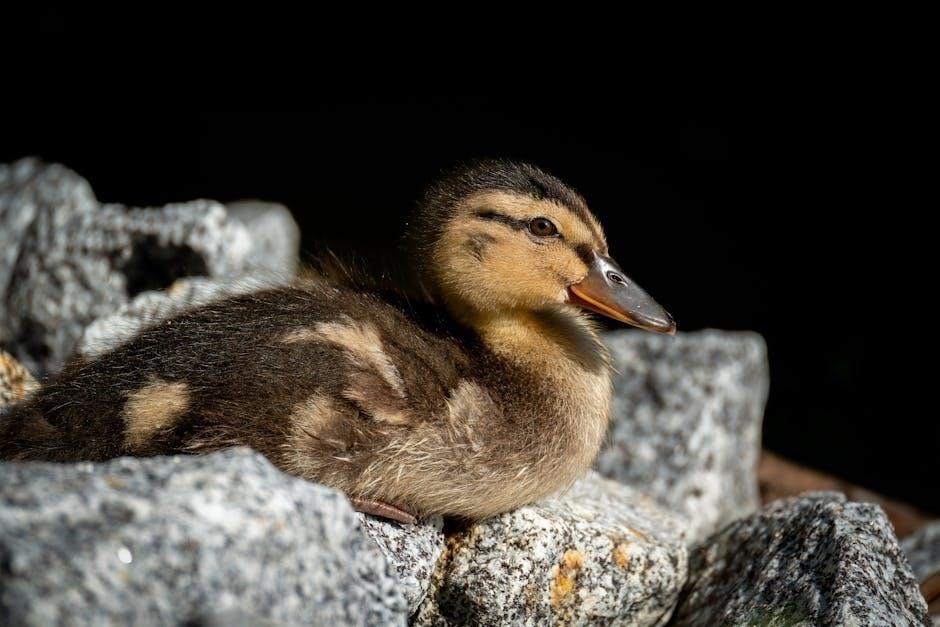
Duck Behavior and Migration Patterns
Ducks exhibit seasonal migration patterns, traveling between breeding and wintering grounds. Their behavior is influenced by habitat, food availability, and weather, with many species relying on wetlands for survival.
6.1 Migration Timelines in North Carolina
In North Carolina, duck migration peaks during fall and spring, with waterfowl species like mallards, teal, and wood ducks passing through coastal wetlands and inland marshes. Timing varies by species, but most migratory ducks arrive in late October and depart by early March. Understanding these patterns is crucial for hunters and conservationists alike, helping to manage habitats and hunting seasons effectively.
6.2 Understanding Duck Habitat Preferences
Ducks prefer habitats with abundant water, vegetation, and shelter. Coastal wetlands, marshes, and freshwater areas are ideal, offering food and nesting sites. Species vary in preferences, with some favoring deep water and others shallow pools. Vegetation density and water depth influence their choice, ensuring safety from predators and access to resources. These preferences shift during migration and breeding seasons, adapting to environmental conditions and survival needs.
Raising Ducks in NC: A Beginner’s Guide
Raising ducks in North Carolina is a rewarding endeavor, offering a unique connection to nature and sustainable living. Beginners can start by learning basic care requirements, including proper feeding, shelter, and water management, to ensure healthy and thriving ducks in both suburban and rural settings.
7.1 Choosing the Right Duck Breed
Choosing the right duck breed in North Carolina involves considering climate tolerance, egg-laying ability, and purpose (e.g., meat, eggs, or pets). Popular breeds like Pekin, Khaki Campbell, and Muscovy thrive in NC’s climate. Beginners should opt for hardy, adaptable breeds that fit their lifestyle and available space, ensuring a successful and enjoyable duck-keeping experience from the start.
7.2 Housing and Feeding Requirements
Providing proper housing and feeding is essential for raising healthy ducks in North Carolina. Ducks need shelter with adequate space and protection from predators. A diet of high-quality layer feed or meat duck feed is recommended, supplemented with fresh vegetables and grains. Access to clean water is crucial for digestion and health. Ensure housing is well-ventilated and kept dry to prevent disease, promoting a thriving environment for your ducks.
Duck Hunting Tips and Strategies
Success in duck hunting requires patience, camouflage, and effective calling. Avoid hunting the roost to prevent scaring ducks. Use decoys strategically and stay concealed to increase your chances of a successful hunt.
8.1 Effective Calling Techniques
Mastering duck calls is crucial for attracting waterfowl. Use high-ball calls to draw distant ducks and switch to softer, more rhythmic calls as they approach. Avoid overcalling, as this can scare birds away. Practice realistic cadences and timing to mimic natural duck communication. A well-timed comeback call can entice wary ducks to return. Keep your calls natural and varied to maintain their interest and trust in your setup.
8.2 Decoy Placement and Setup
Arrange decoys naturally, avoiding perfect circles, as ducks avoid symmetry. Place a few decoys in small groups with space between them to mimic feeding or resting. Use movement decoys like spinners to attract attention. Keep setups simple, especially for beginners, to avoid overwhelming the birds. Position decoys downwind or crosswind to create realistic landing patterns and ensure visibility from a distance. This setup enhances the illusion of a safe, inviting environment for ducks.
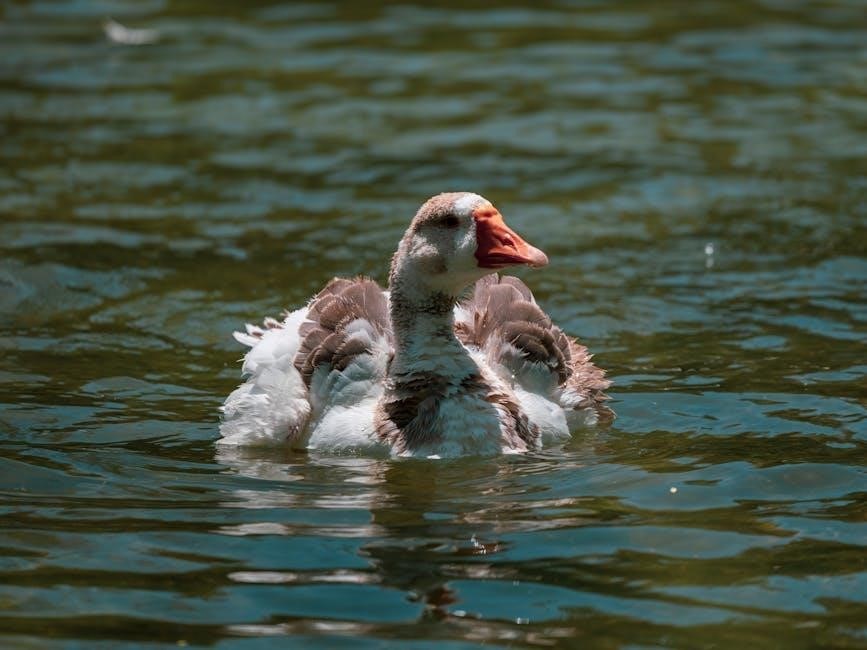
Safety and Etiquette in Duck Hunting
Prioritize firearms safety, ensure proper licenses, and respect private and public land rights. Maintain a clean environment and adhere to ethical hunting practices to preserve wildlife sustainability.
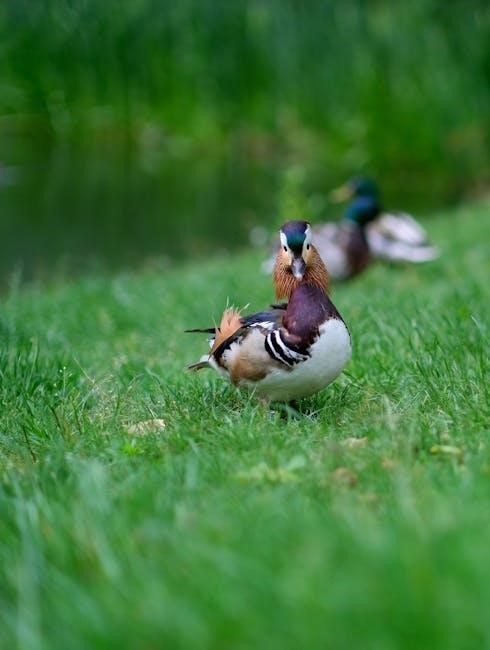
9.1 Firearms Safety Guidelines
Always treat firearms as loaded, keep muzzles pointed away from people, and use safety mechanisms. Be aware of surroundings to avoid accidents. Ensure barrels are clear of obstructions and use appropriate ammunition. Respect others by announcing your presence in shared hunting areas. Avoid hunting near roads or buildings, and store firearms securely when not in use to maintain safety standards.
9.2 Respecting Private and Public Lands
Respecting private and public lands is crucial for maintaining access and ensuring ethical hunting practices. Always obtain permission before hunting on private property and follow all posted regulations. On public lands, adhere to rules regarding access, parking, and habitat protection. Minimize environmental impact by avoiding litter and refraining from damaging vegetation. Be considerate of other land users, such as hikers and photographers, to promote shared enjoyment of natural spaces.
Gear and Equipment for Duck Hunting
Essential gear includes camouflage clothing, waders, shotguns, steel shot shells, and decoys. Proper equipment ensures both success and safety during hunting excursions in North Carolina.
10.1 Essential Clothing and Gear
Essential clothing includes camouflage attire, waterproof jackets, insulated vests, and breathable waders for navigating wet environments. Gear must-haves are binoculars, decoy bags, and a reliable shotgun. Proper footwear, gloves, and hats are crucial for comfort and concealment. Durable, water-resistant gear ensures longevity in harsh outdoor conditions, while appropriate layering helps adapt to varying weather conditions during hunts.
10.2 Recommended Firearms and Ammunition
For duck hunting in NC, a 12-gauge shotgun is ideal due to its range and versatility. Steel shot is recommended for waterfowl to ensure non-toxic ammunition. Choose between a semi-automatic or pump-action shotgun for reliability. Ammunition with sizes 2 to 4 shot is effective for most duck species. Always comply with local regulations regarding firearm types and shot size restrictions.
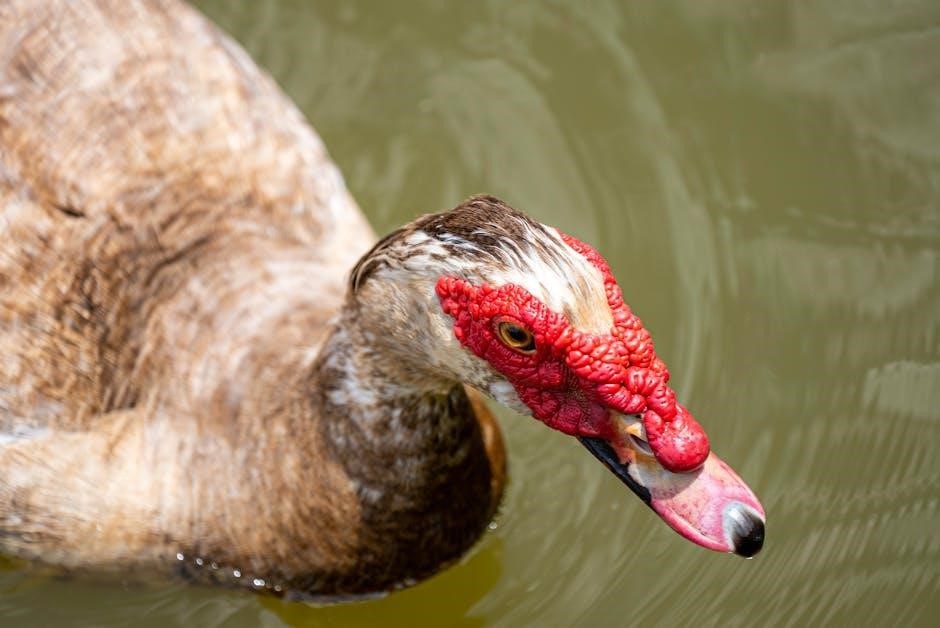
Success Stories and Community Engagement
North Carolina duck hunters share inspiring tales of successful outings and community-driven initiatives, fostering camaraderie and conservation efforts through shared experiences and educational events.
11.1 Notable Duck Hunting Experiences in NC
Notable duck hunting experiences in North Carolina highlight thrilling adventures across coastal marshes and inland waters. Hunters share tales of bagging prized species like wood ducks and mallards. Stories often emphasize the state’s abundant waterfowl diversity and the camaraderie forged during guided excursions. Many recount the excitement of early morning hunts in the Outer Banks or the Pamlico Sound, where skilled guides ensure memorable outings. These experiences underscore NC’s reputation as a premier destination for waterfowl enthusiasts.
11.2 Joining Local Duck Hunting Communities
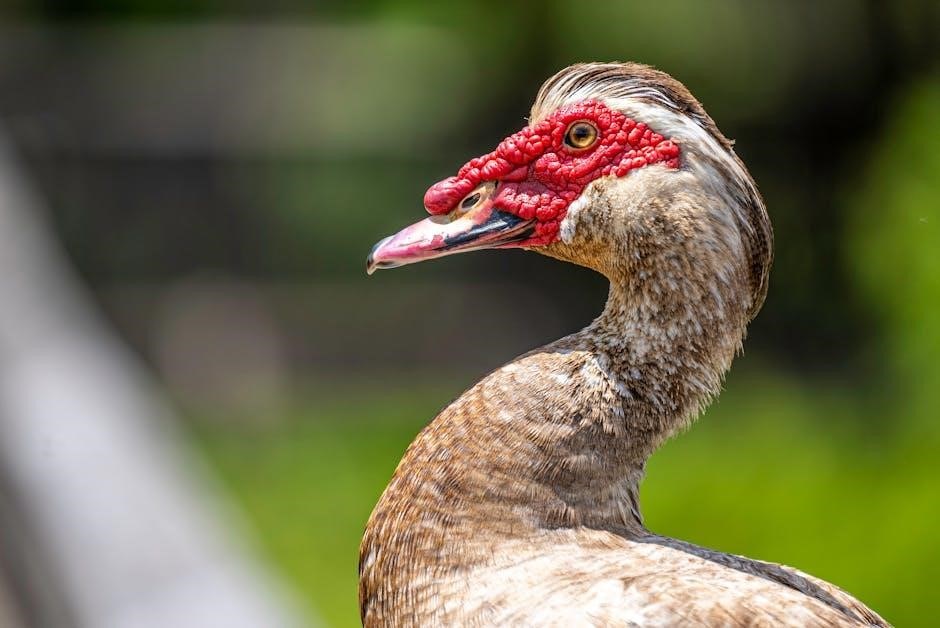
Joining local duck hunting communities in North Carolina fosters camaraderie and shared passion for waterfowl hunting. These groups provide networking opportunities, skill-sharing, and access to guided hunts. Many communities organize charity events and conservation projects, strengthening bonds among members. Participating in local clubs or forums allows hunters to learn from experienced guides and gain insights into the best hunting spots across the state, enhancing their overall hunting experience.
